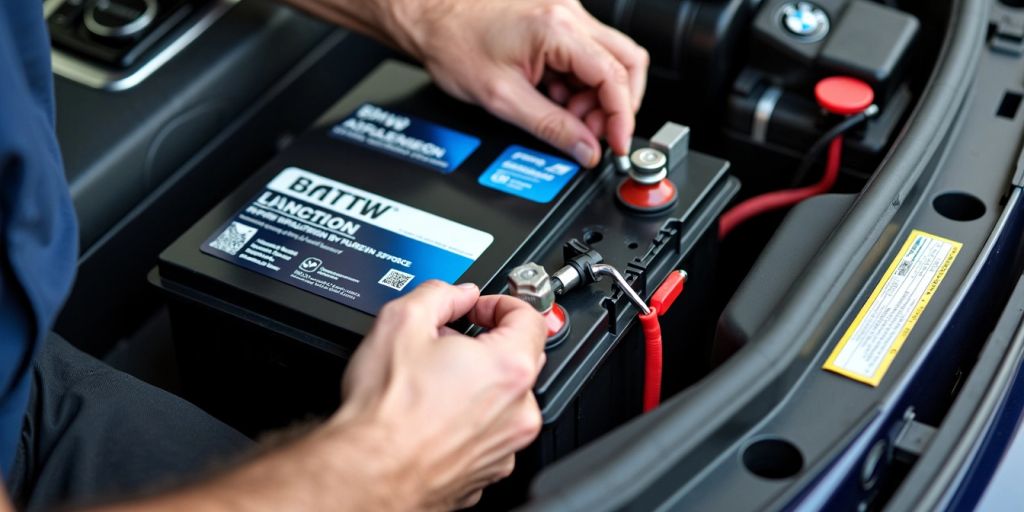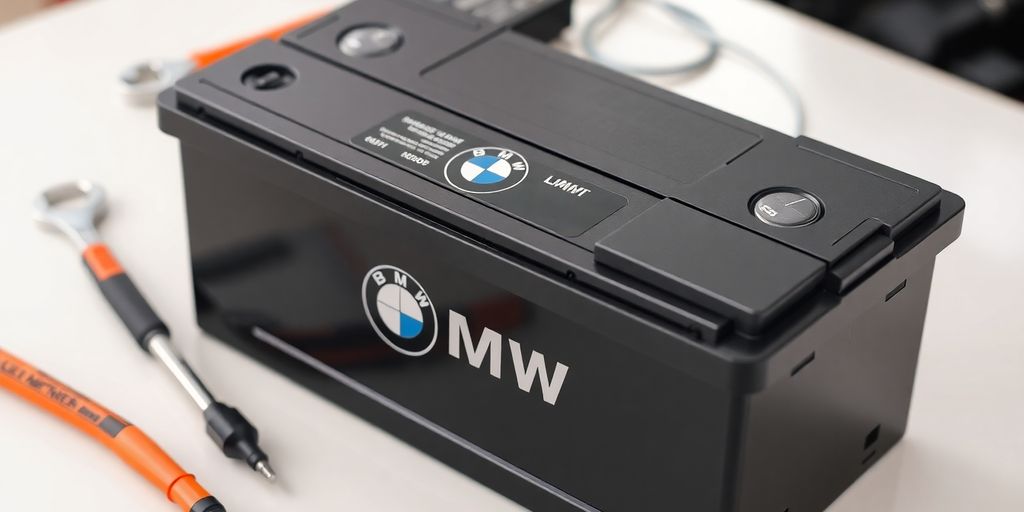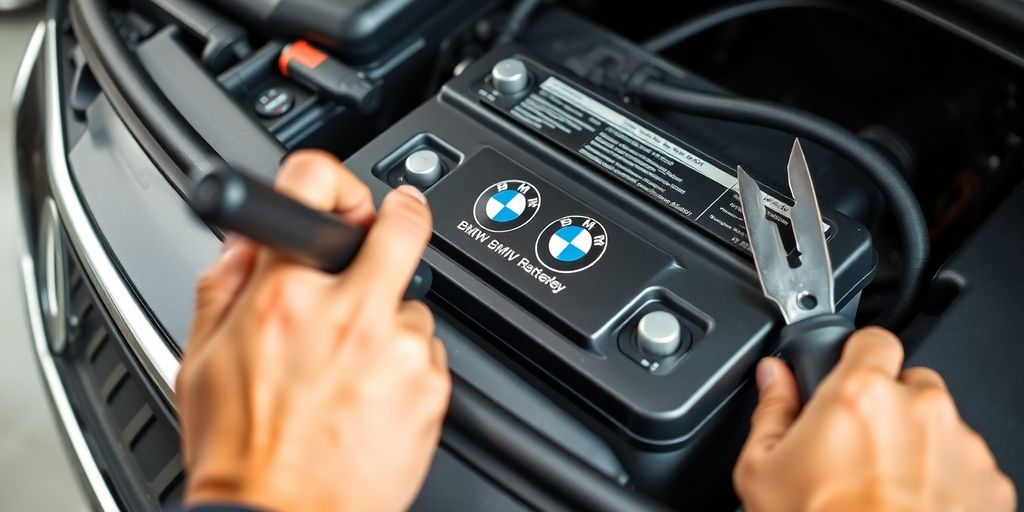
Finding the Best BMW Battery Replacement Near Me: A Complete Guide
If you’re looking to replace the battery in your BMW, it’s important to understand the types of batteries available, the steps involved in replacing it, and the significance of battery registration. This guide will help you navigate the process smoothly, whether you choose to do it yourself or seek professional help.
Key Takeaways
- Know the different types of BMW batteries: Liquid Lead Acid, Gel Lead-Acid, and AGM.
- Follow the correct steps for battery replacement to avoid damage: locate, disconnect, install, and secure.
- Always register your new battery to ensure your car’s performance and avoid electrical issues.
- Consider the pros and cons of DIY replacement versus hiring a professional mechanic.
- Research local battery replacement services and read reviews before making a choice.
Understanding BMW Battery Types
When it comes to BMW batteries, understanding the different types is crucial for making the right choice. Here’s a breakdown of the main types:
Liquid Lead Acid Batteries
Liquid Lead Acid batteries are the most common type. They have flooded cells and can be identified by their caps on top, which allow you to add distilled water. These batteries are reliable but require regular maintenance.
Gel Lead-Acid Batteries
Gel Lead-Acid batteries are sealed and contain a gel-like electrolyte. They are safer than liquid batteries because they don’t spill. To check if you have a gel battery, shake it; if it doesn’t move, it’s gel-filled. These batteries are great for extreme driving conditions.
Absorbed Glass Matt (AGM) Batteries
AGM batteries are also sealed and use glass fibers to hold the electrolyte. They are known for being safer and more durable. If the casing is damaged, the acid won’t leak out. They don’t require maintenance and are ideal for high-performance vehicles.
| Battery Type | Maintenance Required | Safety Level | Common Use Cases |
|---|---|---|---|
| Liquid Lead Acid | Yes | Moderate | Standard vehicles |
| Gel Lead-Acid | No | High | Extreme conditions |
| Absorbed Glass Matt (AGM) | No | Very High | High-performance vehicles |
Understanding the type of battery you need is essential for your BMW’s performance and longevity. Choosing the wrong type can lead to issues down the line.
Steps to Replace Your BMW Battery
Replacing your BMW battery can seem tricky, but it’s manageable if you follow these steps carefully. Make sure to have the right tools ready!
Locating the Battery
- Turn off the ignition and remove the key.
- Find the battery, usually located in the trunk, either on the floor or the right side.
- Remove any covering or liner that hides the battery.
Disconnecting the Old Battery
- Use a 10mm wrench to disconnect the negative terminal first. Keep the cable away from the battery.
- Next, disconnect the positive terminal by lifting the red cover and loosening the 10mm nut.
Installing the New Battery
- Remove the old battery carefully; it can be heavy.
- Before installing the new battery, take a picture of its model number and specifications for future reference.
- Place the new battery in the same spot as the old one, ensuring it fits securely.
Securing the Battery
- Reinstall the brackets that hold the battery in place, but don’t over-tighten them to avoid cracking the battery housing.
- If you’re using a Liquid Lead-Acid battery, connect it to the vent hose to prevent gas buildup in the trunk.
- Finally, clean the battery posts and connect the terminals: positive first, then negative.
Remember, if you’re unsure about any step, it’s best to consult a professional. For expert BMW repair services, consider visiting near me services – the garage for assistance!
The Importance of BMW Battery Registration

What is Battery Registration?
Battery registration is a process that updates your BMW’s system to recognize that a new battery has been installed. This step is essential for all BMW models made after 2002. It ensures that the vehicle’s battery management system can effectively manage the new battery.
Why is Battery Registration Necessary?
When you replace your battery, the car needs to know about the new specifications. If you skip this step, it can lead to several issues:
- The battery may not charge properly.
- You could face electrical problems in your car.
- The battery life might decrease significantly.
Consequences of Skipping Registration
Failing to register your new battery can cause serious problems:
- Overcharging or undercharging the battery.
- Potential damage to the vehicle’s alternator.
- Electrical system errors, like windows or lights not working.
Proper battery registration is crucial for maintaining your BMW’s performance and longevity. Without it, you risk damaging your vehicle’s electrical system.
In summary, registering your BMW battery is not just a formality; it’s a necessary step to ensure your vehicle runs smoothly and efficiently. Don’t overlook this important process!
DIY vs Professional BMW Battery Replacement
When it comes to replacing your BMW battery, you have two main options: doing it yourself or hiring a professional. Both methods have their own advantages and disadvantages.
Pros and Cons of DIY Replacement
- Cost Savings: Doing it yourself can save you money on labor costs.
- Control: You have full control over the process and can ensure everything is done to your standards.
- Learning Experience: It’s a great opportunity to learn more about your vehicle.
However, there are some downsides:
- Time-Consuming: It may take longer if you’re not familiar with the process.
- Risk of Mistakes: Incorrect installation can lead to further issues.
- Lack of Warranty: DIY work may void any existing warranties on your vehicle.
When to Seek Professional Help
- If you’re not comfortable with tools or car maintenance.
- If your BMW requires battery registration, which can be complex.
- If you notice any unusual electrical issues that may need expert diagnosis.
Cost Comparison
| Service Type | Average Cost |
|---|---|
| DIY Replacement | $100 – $200 |
| Professional Service | $200 – $400 |
In summary, while a DIY battery replacement can be rewarding and cost-effective, it’s essential to weigh the risks and benefits. If you’re unsure, it’s always best to consult a professional.
Remember, proper installation is crucial for your BMW’s performance and longevity. If you have any doubts, don’t hesitate to reach out to a reliable service provider for assistance. Researching local services can help you find the right fit for your needs.
Choosing the Right Battery for Your BMW
When it comes to selecting a new battery for your BMW, it’s essential to understand the different types available. Choosing the right battery can significantly affect your vehicle’s performance. Here’s what you need to know:
Matching Specifications
- Type: Ensure the battery type matches your vehicle’s requirements (e.g., Liquid Lead Acid, Gel, or AGM).
- Capacity: Look for a battery with similar capacity to your old one to maintain performance.
- Size: Make sure the new battery fits in the designated space in your car.
Battery Brands to Consider
- Bosch: Known for reliability and performance.
- Exide: Offers a range of options for different BMW models.
- Optima: Popular for high-performance needs.
Where to Buy Your Battery
- Local Auto Parts Stores: Often have a variety of options and knowledgeable staff.
- Online Retailers: Can provide competitive prices and home delivery.
- Authorized BMW Dealers: Ensure you get the right specifications and warranty.
Remember, understanding what you should know about your BMW battery is crucial for making an informed choice. This includes knowing the features, maintenance needs, and lifespan of the battery.
By following these guidelines, you can confidently choose the best battery for your BMW, ensuring it runs smoothly for years to come.
Common Issues and Troubleshooting

Battery Not Holding Charge
If your BMW battery is not holding a charge, it could be due to several reasons:
- Old Age: Batteries typically last 3-5 years.
- Corrosion: Check for corrosion on the terminals.
- Faulty Alternator: Ensure your alternator is working properly.
Electrical System Errors
Sometimes, you might see warning lights on your dashboard. This can indicate:
- A weak battery.
- Issues with the electrical system.
- Problems with the battery connections.
When to Replace Your Battery
You should consider replacing your battery if:
- Your car struggles to start.
- You notice dimming lights.
- The battery is over three years old.
Regular maintenance can help avoid unexpected battery issues. Stay proactive!
Finding a Reliable BMW Battery Replacement Service Near You
When it comes to replacing your BMW battery, finding a trustworthy service is crucial. A reliable service can save you time and money. Here are some tips to help you in your search:
Researching Local Services
- Look for BMW service centers in your area.
- Check if they specialize in battery replacements.
- Verify their certifications and experience with BMW vehicles.
Reading Reviews and Testimonials
- Read online reviews to gauge customer satisfaction.
- Ask friends or family for recommendations.
- Look for testimonials on the service provider’s website.
Questions to Ask Your Service Provider
- What types of batteries do you offer?
- Do you provide battery registration services?
- What is the estimated cost for the replacement?
Finding the right service can make a big difference in your BMW’s performance. Always choose a service that understands the specific needs of your vehicle.
By following these steps, you can ensure that you find a reliable BMW battery replacement service near you. Don’t forget to check for battery service options like those available at a BMW service center in Fort Worth, TX for quality assurance!
Final Thoughts on BMW Battery Replacement
In conclusion, replacing your BMW battery doesn’t have to be a daunting task. By following the steps outlined in this guide, you can confidently tackle the job yourself. Remember to always check the type of battery you need and ensure proper registration after installation. This will help your BMW run smoothly and avoid any electrical issues down the road. If you feel unsure about any part of the process, don’t hesitate to reach out to a professional for help. Keeping your BMW in top shape is worth the effort!
Frequently Asked Questions
What types of batteries does a BMW use?
BMW cars typically use three types of batteries: Liquid Lead Acid, Gel Lead-Acid, and Absorbed Glass Matt (AGM). Each type has its own characteristics and care requirements.
How do I change the battery in my BMW?
To change your BMW battery, first turn off the car and find the battery, usually in the trunk. Disconnect the old battery, replace it with a new one, and secure it properly.
Why do I need to register my new BMW battery?
Battery registration is important because it helps your car’s computer know that a new battery is installed. This prevents issues like overcharging or undercharging.
Can I replace my BMW battery myself?
Yes, you can replace your BMW battery on your own if you follow the steps carefully. However, registering the new battery might require professional help.
What happens if I don’t register my BMW battery?
If you don’t register your battery, it could lead to electrical problems, reduced battery life, or even damage to your car’s electrical system.
How can I find a good battery replacement service for my BMW?
To find a reliable battery replacement service, research local options, read reviews, and ask questions about their experience with BMWs.

